The Eastern Fells
The Eastern Fells was published in May 1955 and was dedicated to:
“THE MEN OF THE ORDNANCE SURVEY whose maps of Lakeland have given me much pleasure both on the fells and by my fireside”
<<>>
On a cold autumn evening, November 9, 1952, Alfred Wainwright embarked on a thirteen-year guidebook odyssey that would transform not only his life but also the experiences of millions exploring the Lake District. The first book in his series, The Eastern Fells, described by Wainwright as a “love letter” to Lakeland, has remained unparalleled in its artistry for nearly 70 years. Each meticulously handwritten page, perfectly justified, is a visual delight.
Before Wainwright, guidebooks to the Lakeland Fells were often dull and uninspiring. His revolutionary approach, with meticulous attention to detail, transformed these guides into works of art. Despite technological advances, no modern guide has equalled them.
Wainwright immersed readers in a world of poetry and delight, bringing the three-dimensional mountains to life on a two-dimensional sheet of paper. He invited these majestic hills into our homes, connecting readers to the landscapes he loved in a very personal and profound way through the written word—a remarkable skill.
When Wainwright began writing that frosty night, the project initially served as a personal journal of his walks, allowing him to reminisce when he could no longer traverse the fells. After completing the work, he realised the book could help other walkers on the fells.
Wainwright approached Sandy Hewitson of Bateman and Hewitson Ltd, a nearby printer on Finkle Street, Kendal. Handing over his handwritten pages, Sandy was captivated by the sheer brilliance of Wainwright’s work. Sandy calculated the cost of producing 500 copies, but the expense was uneconomical. The only viable solution to reduce the per-copy cost was to print 2,000 copies, totalling £900. Unfortunately, Wainwright had only £35 to his name. However, Sandy reassured him, confident that the book would sell, and offered a payment plan as the books sold. Delighted by this arrangement, Wainwright accepted the offer.
Bateman & Hewitson Ltd, a small jobbing printer that specialised in leaflet production, found printing a book beyond their capabilities. Consequently, they awarded the printing contract to the much larger and well-established Westmorland Gazette in Kendal.

Wainwright was apprehensive that external publishers might alter the layout and employ their own typesetting. Determined to retain complete control, Wainwright opted for self-publishing as the most fitting path for his vision.
Wainwright sought publishing advice and consulted Henry Marshall, the Chief Librarian of Kendal and Westmorland. Henry suggested that assuming both the roles of author and publisher might not be ideal. Consequently, Henry became Wainwright’s publisher, managing sales and distribution from his home in Kentmere. Wainwright also preferred using Henry’s name over his own. The rest is history.
Seven decades later, The Eastern Fells remains as relevant as ever. Part of a series of seven Pictorial Guides to the Lakeland Fells, they remain the definitive guide to the Lake District, unmatched by any other. Wainwright’s work has become embedded in Cumbria’s literary history alongside luminaries like Wordsworth and Beatrix Potter.
Published in May 1955, all 2,000 copies were sold before the spring of 1956. Wainwright, Henry, and the Gazette’s Printing Manager Harry Firth actively promoted the books by visiting central Lake District towns. Additional marketing efforts included the production of leaflets to stimulate more orders. The book garnered further attention through a hand-drawn advertisement in June’s Cumbria magazine, and a positive review was featured in The Scouter magazine in July 1955.

The compact guide, priced at 12s 6d, boasted over 300 pages and a stunning array of no fewer than 500 beautiful illustrations. Noteworthy features included rounded corners on the case and pages, facilitating effortless removal from one’s pocket. The aesthetically pleasing design was enhanced with attractive gold blocking on the front cover and spine.
<<>>
A First Edition is identified by:
- Dark green case with round corners and gold blocking
- No impression number
- Book Two listed as – in preparation

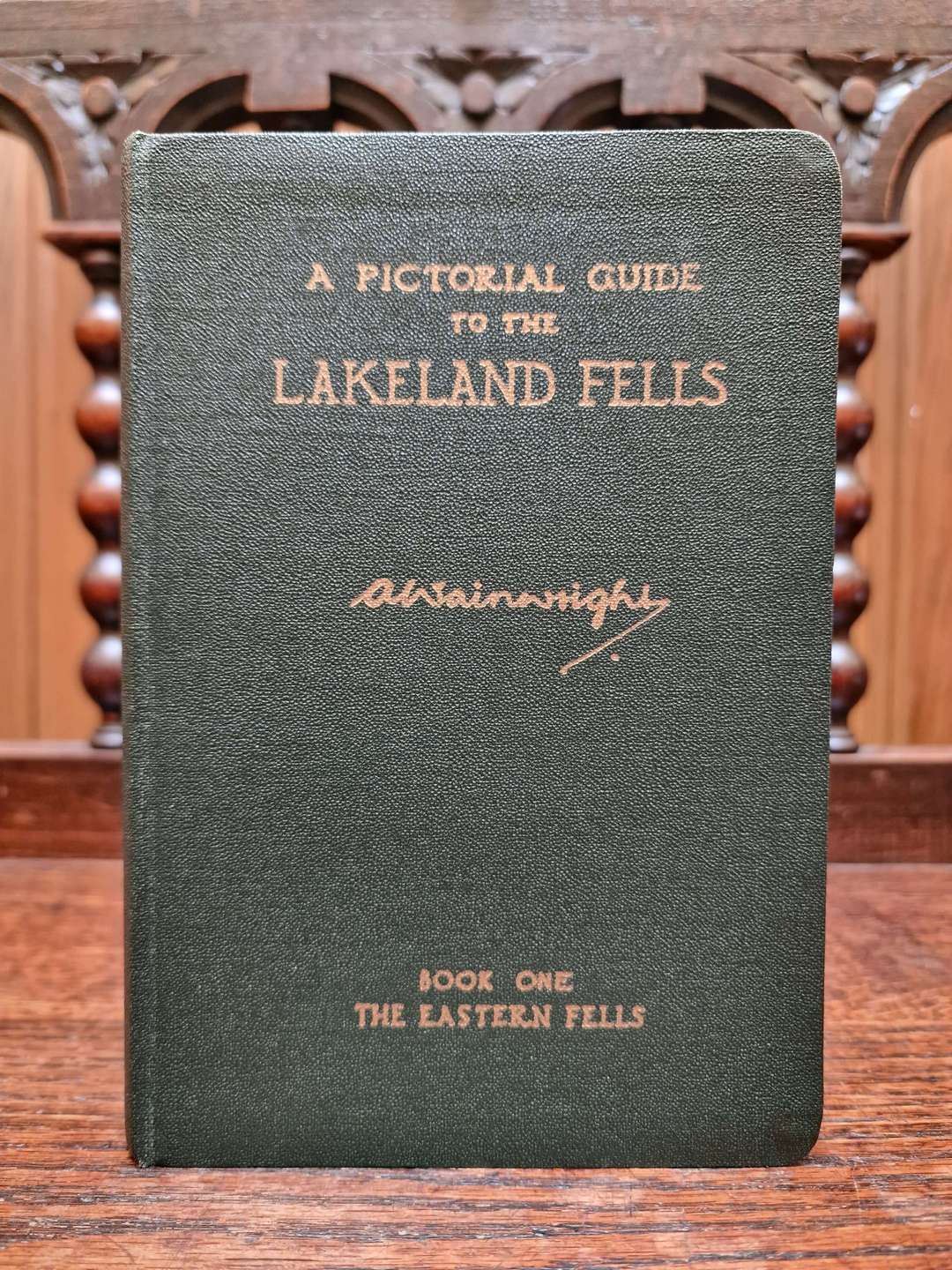
The second impression, introduced during Easter 1956, featured the addition of a dust jacket. The case material exhibited a considerably darker hue than the first impression. First Edition owners were offered the option to request a complimentary dust jacket from the Gazette. It’s worth mentioning that the early jackets lacked lamination, causing the paper to gradually absorb the gold blocking from the front of the guide over time.
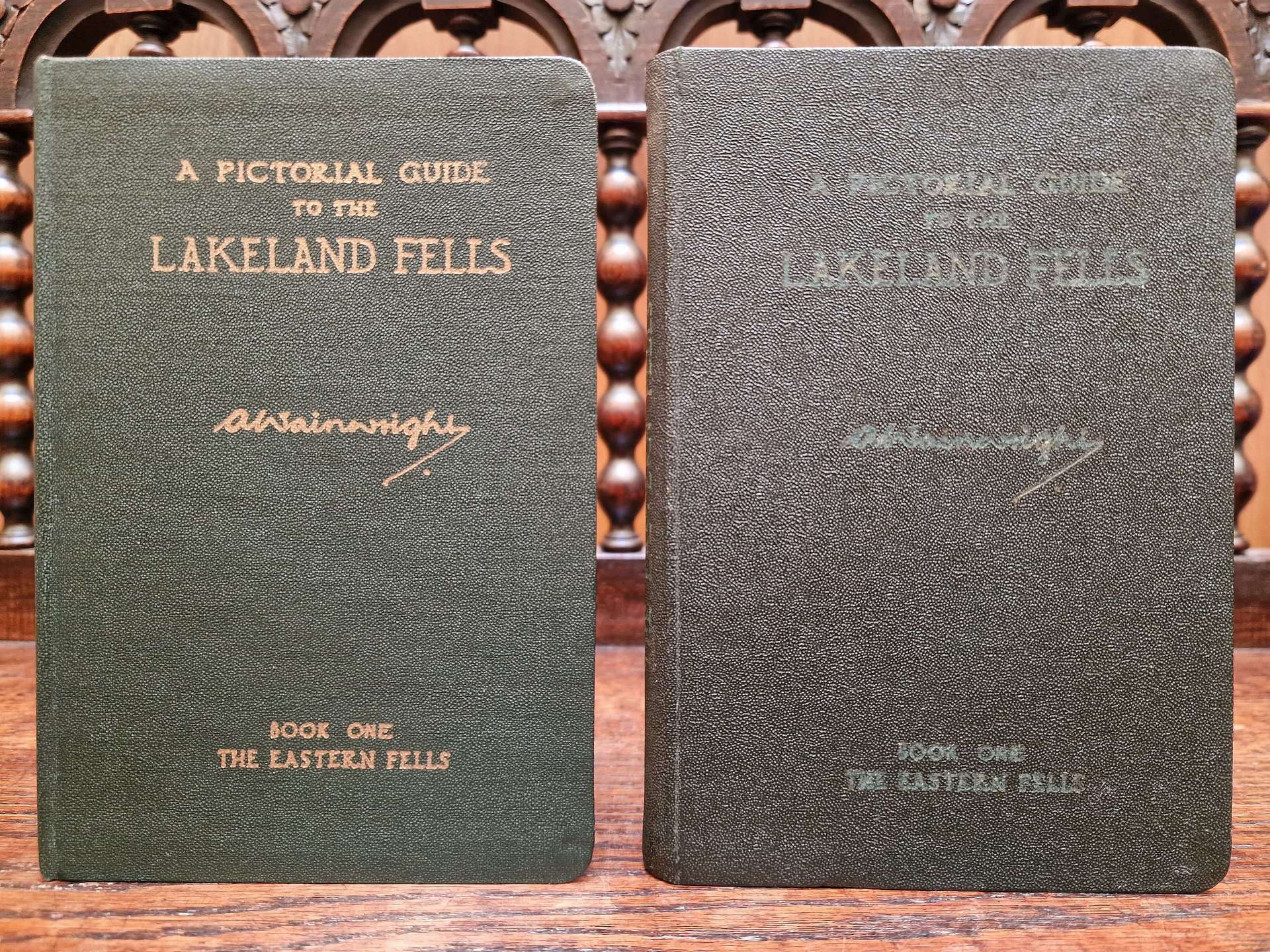

Several years later, the Gazette acquired Bateman & Hewitson Ltd. Eric Bateman seamlessly transitioned to the Gazette, assuming the role of foreman in the bindery department, where he remained until his retirement in the 1970s. In gratitude for Eric’s invaluable assistance in producing the Pictorial Guide series, Wainwright presented him with a complete set of signed guides, individually bestowed as each was published.

In 1955, the first The Eastern Fells emerged from the press under the careful oversight of Eric Teby, the Printing Foreman at the Gazette. It was signed by Wainwright and preserved in mint condition for decades. The book was eventually acquired by Kirkland Books of Kendal, established by David Stockley in 1980. He was the authority on Wainwright book collecting in Cumbria for many years. After David’s retirement, the shop changed ownership and was eventually dissolved in 2020.


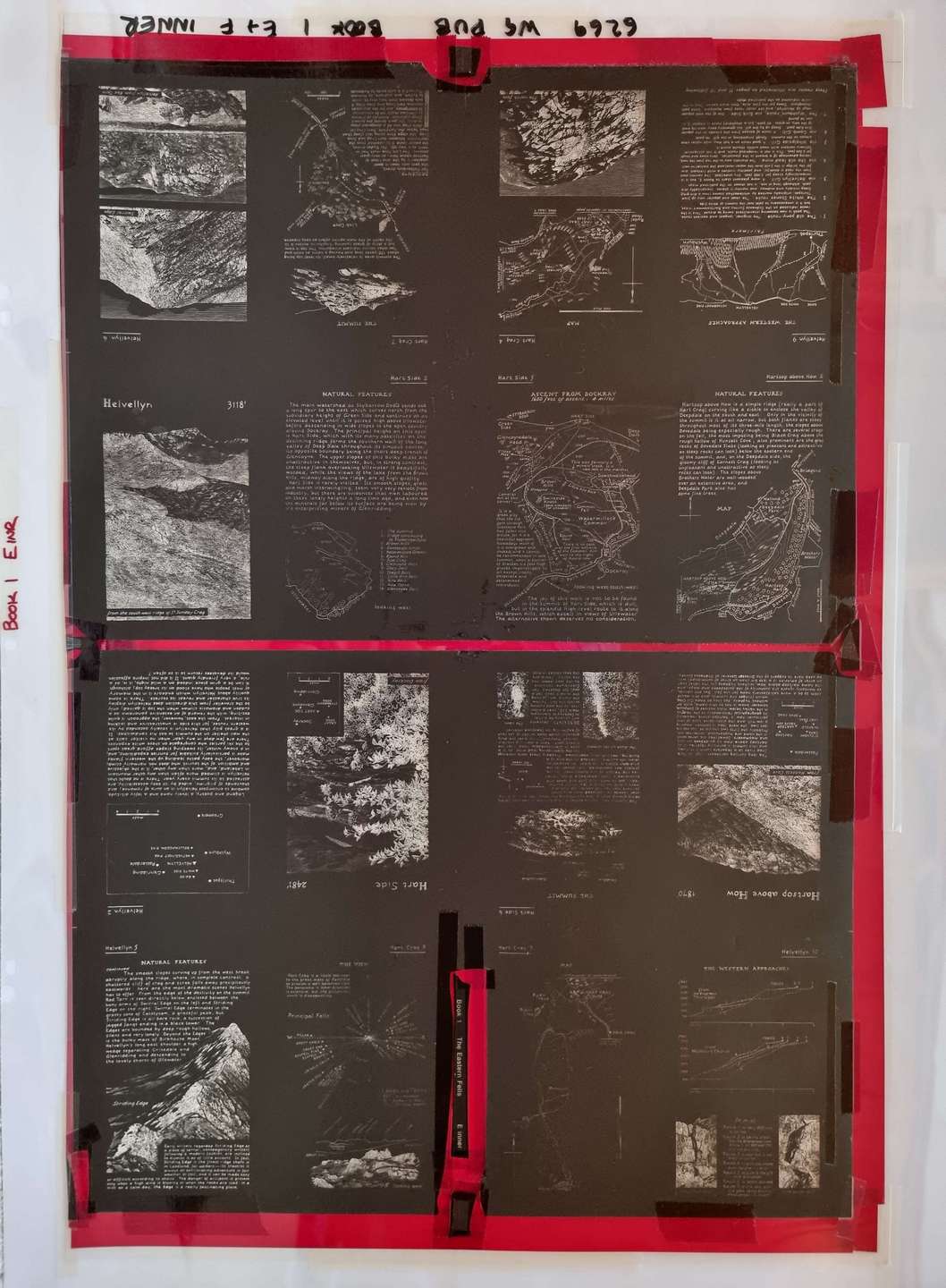
Sales gained momentum around the fifth impression, and with the release of The Southern Fells in 1960, The Eastern Fells had already reached its sixth impression.
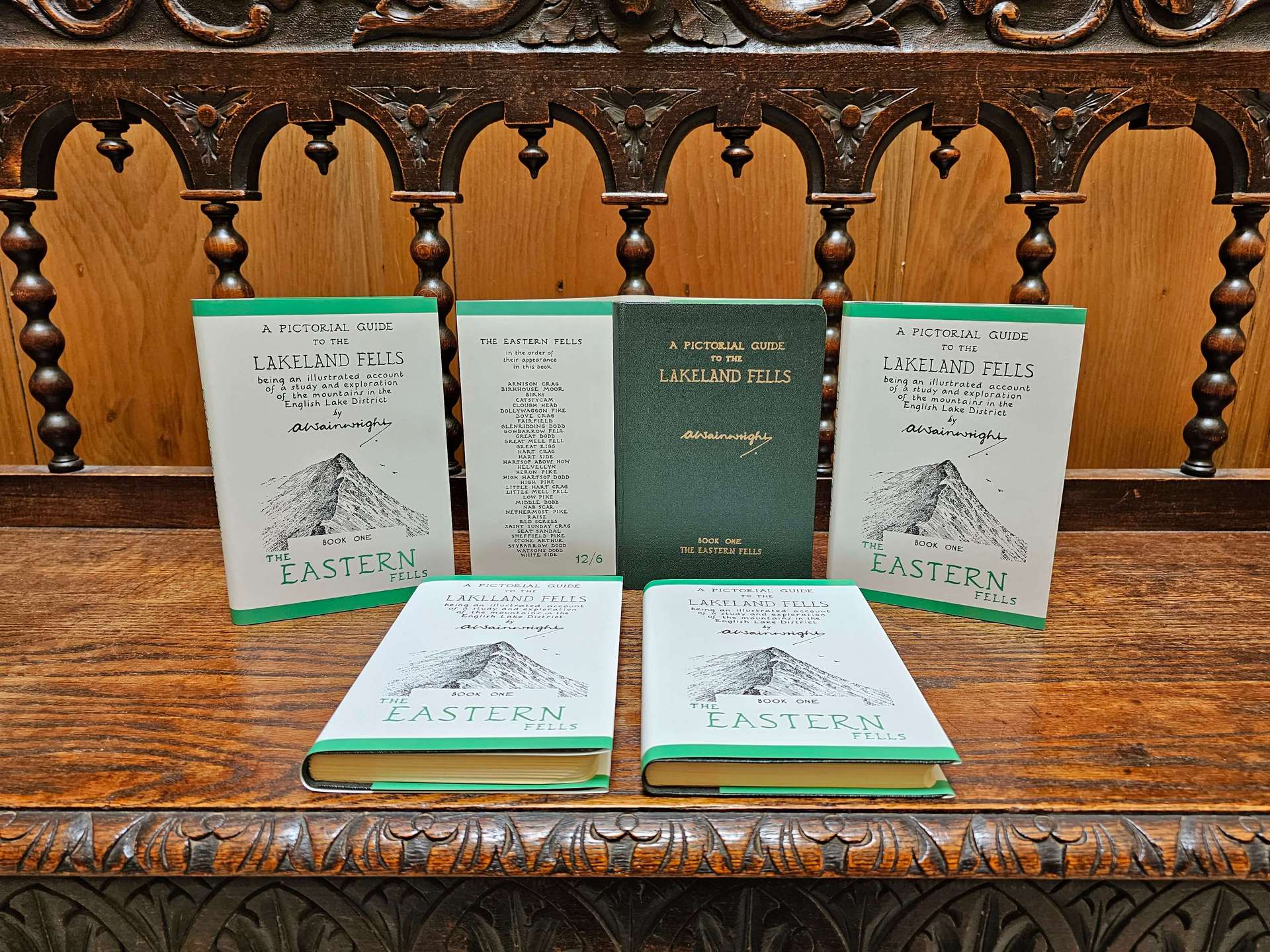







The Eastern Fells underwent several physical alterations and received new editions from various publishers. In 1971, with the advent of decimalisation, the guide’s first price in the new currency was set at 90p. Subsequently, the once-round corners were replaced with square ones, contributing to cost efficiency in case production. A few years later, a scarcity of case colours emerged due to oil shortages in the Middle East, affecting the Gazette’s supplier in Nuneaton. Consequently, the original seven-book colours were replaced by a variety: yellow, grey, burgundy, and blue.
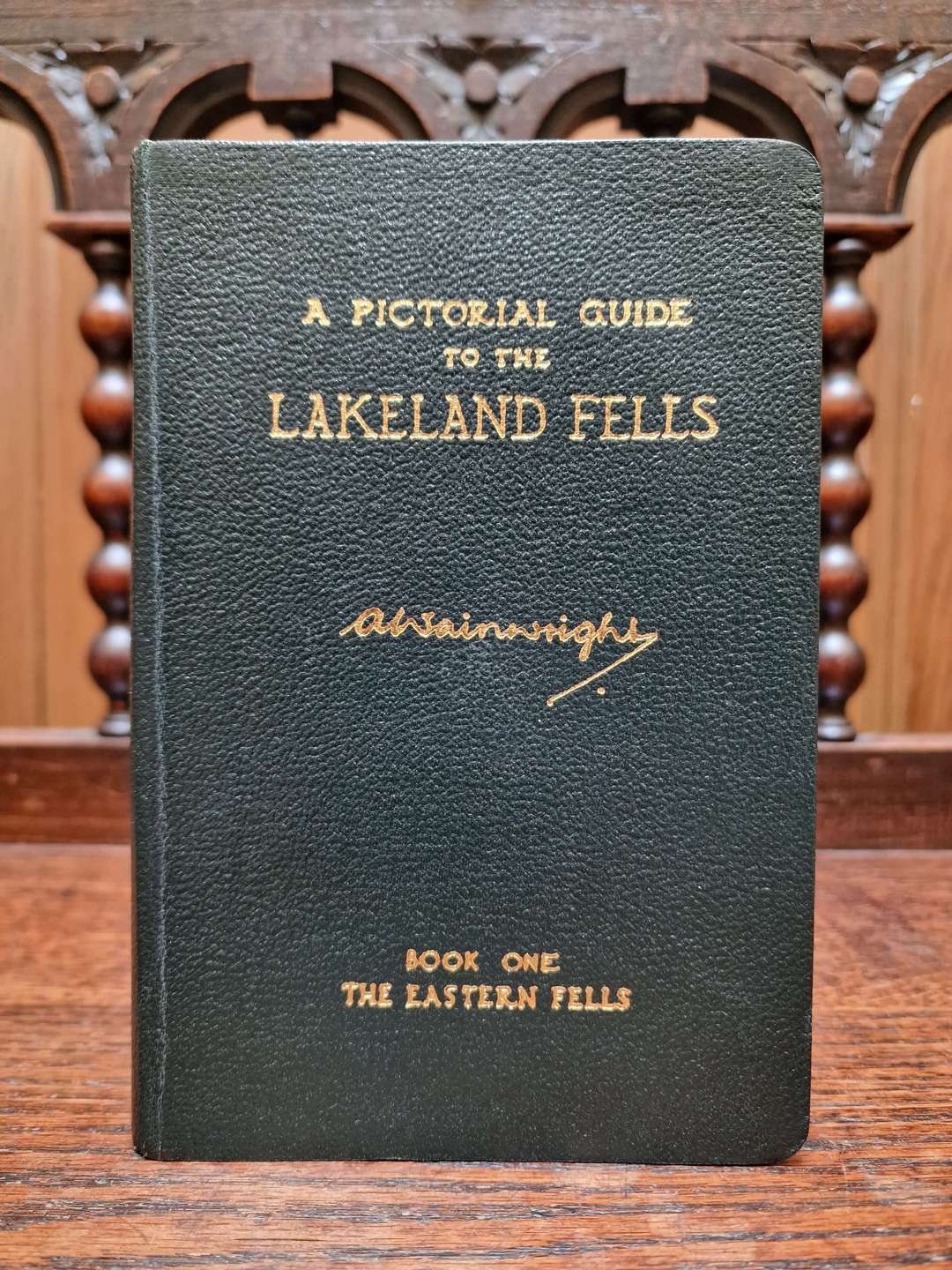

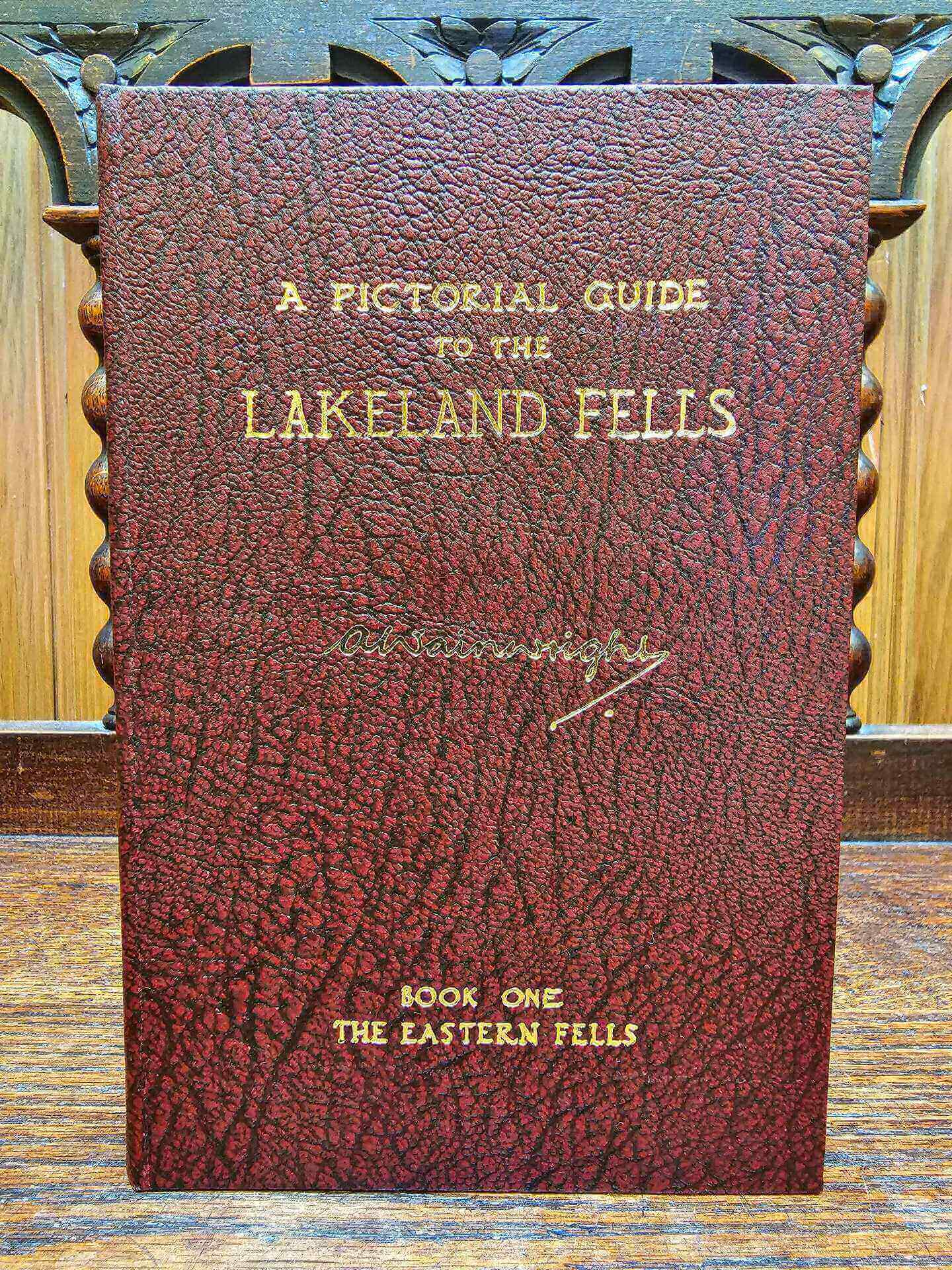
In the mid-1970s, material shortages escalated, leading the Gazette, with Wainwright’s approval, to adopt a uniform green-coloured faux leather case for all guides. As the demand increased, guides were printed in batches of 3,000 per impression, with binding carried out in increments of 1,000 at a time. The persistent shortages occasionally resulted in using multiple case types for the same impression.
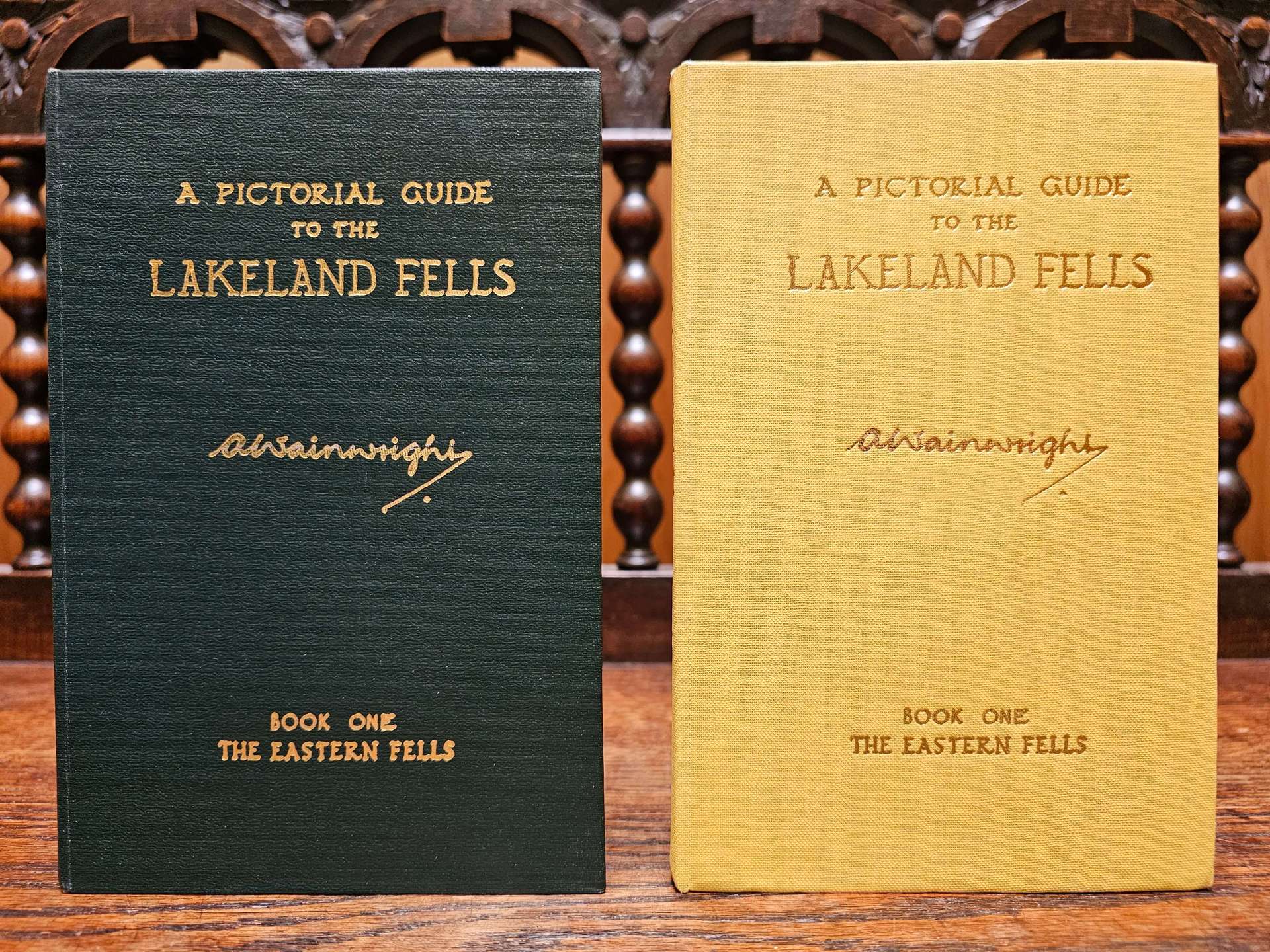

By the latter half of 1980, the gold blocking on the front of the case was eliminated, as it became redundant with the introduction of dust jackets for the guides. This strategic decision also reduced production costs. Another modification occurred in the subsequent two years: the printed prices on the dust jackets were replaced with stickers. Numerous jackets with older prices were clipped or covered with stickers to update existing inventory.
In the mid-1980s, the long-standing practice of including impression numbers on the guides was discontinued. This change simplified the design and eliminated one printing plate for each new impression. Given that some books had reached their hundredth impression, the numbers had become less relevant.







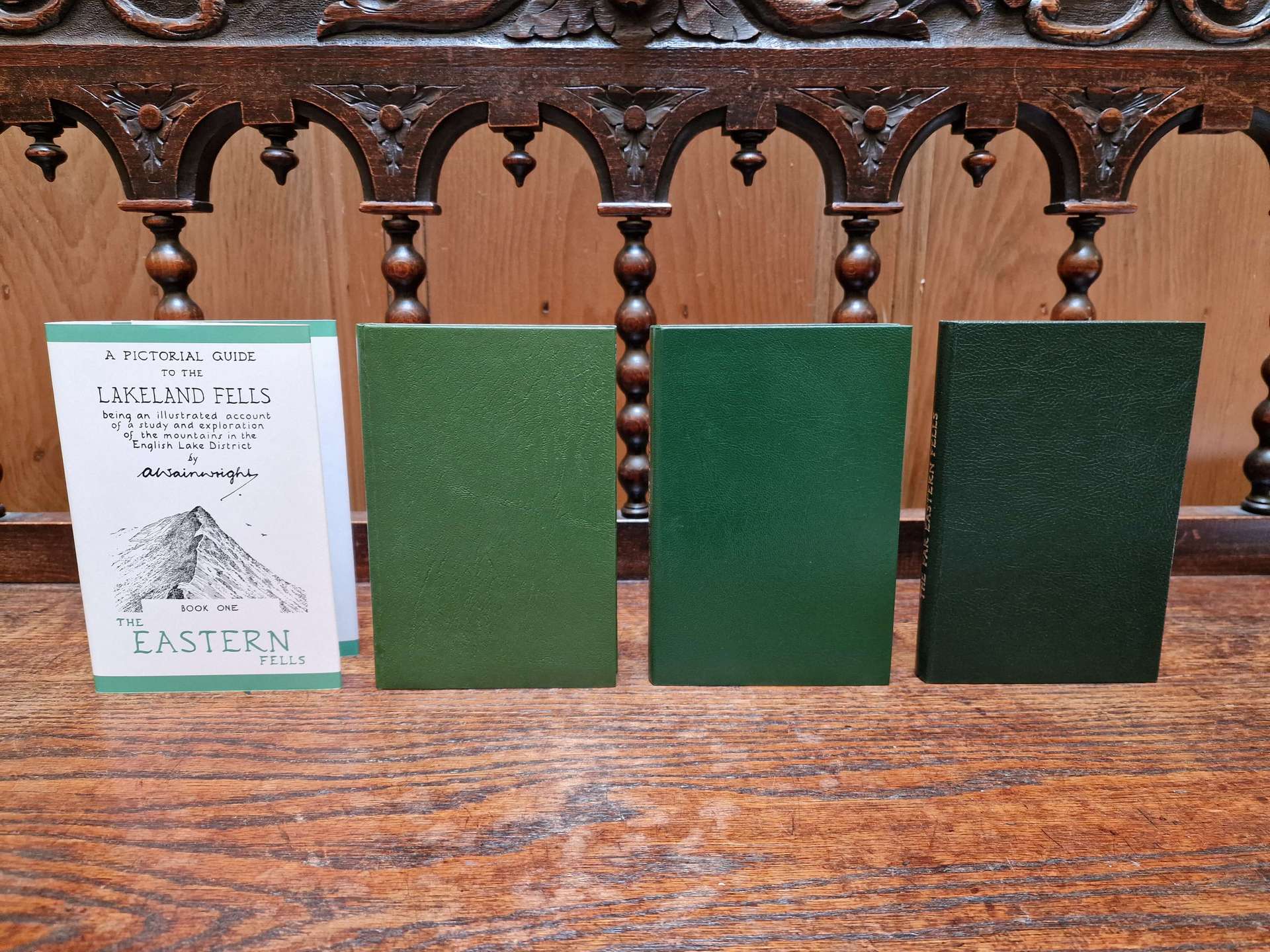
The faux leather cases produced in the 1980s displayed a smoother texture compared to those from the mid to late 1970s. A close inspection of the case material can identify the approximate printing date. In 1988, Titus Wilson & Son Ltd secured a four-year contract to print the Wainwright guides, while the Gazette retained the publishing rights. See The Gazette Prints its Final Book for the whole story.


Several months after Wainwright’s passing, the book publishing rights transitioned to Michael Joseph. The new guides’ debut occurred in April 1992 and proved successful. The initial impression, printed in Kendal by Titus Wilson, carried a retail price of £8.99. Regrettably, in the spring of 1993, Michael Joseph discontinued their association with Titus Wilson, relocating the printing operations to Bungay, Suffolk, for all subsequent impressions. This move diverged from Wainwright’s wishes for the books to remain in Kendal.






For the subsequent decade, the guides stayed in the South of England. Around the turn of the millennium, book sales started to decelerate, leading to the eventual transfer of copyright to Betty Wainwright. Her name graced a few more impressions before Michael Joseph ceased publishing the guides in 2003.
For the first time, Wainwright’s renowned guides went out of print. However, the sorrow was brief, as the Gazette revealed Frances Lincoln as the new publisher. Moreover, the guides were set to return to their original home in Kendal. The official launch occurred in April 2003, with each guide priced at £11.99. Rapid sales by Easter prompted Titus Wilson to enlarge their premises to accommodate the increased stock. Given their success, Frances Lincoln promptly commenced preparations for their next significant book launch.



In commemoration of the 50th anniversary of Wainwright’s inaugural guidebook in May 1955, Frances Lincoln embarked on a celebratory project. They carefully scanned Wainwright’s original artwork for the new guides. In cases where some pages were absent, scans from older guides were utilised to fill the gaps seamlessly. To maintain authenticity, the paper was sourced from James Cropper of Burneside to match the First Editions precisely. The binding material was also chosen to match that of the original guides.

From left to right:
The Eastern Fells (50th), F. Lincoln 2005
The Eastern Fells (50th) Leather-Bound, F. Lincoln 2005












The 50th Anniversary Editions debuted in paperback format and were presented as a box set in June 2023. See the Wainwright Box Set Collection for details.

The 50th Anniversary Editions, initially printed in Kendal, were priced at £11.99 upon launch, later increasing to £12.99. A limited run of 200 Leather-Bound box sets were also available for £250. In 2006, the guides departed from their original printing location in Kendal, undergoing printing processes in Italy, Singapore, and Thailand before ultimately relocating to China, accompanied by a price adjustment to £13.99.
The original books are works of art and masterpieces of their era. However, by 2003, they had become outdated and impractical for contemporary walk planning. Recognising this, Frances Lincoln created a new guidebook series tailored for use on the fells. A crucial objective was maintaining fidelity to Wainwright’s originals on each page. Chris Jesty, a cartographer from Kendal, was entrusted with this delicate task, dedicating a decade of his life to the project.
The Eastern Fells – Second Edition was released in June 2005, priced at £12.99. Subsequently, the cost rose to £13.99 and later to £14.99. In 2007, Chris Jesty amended the guide, which was printed in Singapore, Thailand, and China.

Initially, the Second Editions lacked sufficient distinction from the original series. Consequently, starting with the second book, the dust jackets were swapped for new ones featuring photographs of Lakeland scenes by Derry Brabbs.
The Complete Pictorial Guides – A Reader’s Edition was introduced in 2009. This exclusive box set included ten cloth-bound guides featuring enlarged type and drawings ten per cent larger than the originals. Modelled after the 50th Anniversary Editions, the set was priced at £159.99.
In 2011, Quarto acquired Frances Lincoln, a publisher specialising in children’s and horticultural literature, for £4.5 million. Managing Director John Nicoll retained control throughout the transitional phase and continued to contribute as a consultant.

From left to right:
The Eastern Fells (SE) original Jacket, F. Lincoln 2005
The Eastern Fells (SE) photo Jacket, F. Lincoln 2005
The Eastern Fells (SE) revised, F. Lincoln 2007
The Eastern Fells (RE) low gsm paper, F. Lincoln 2009
The Eastern Fells (RE) high gsm paper, F. Lincoln 2009
Nearly a decade into Chris Jesty’s revisions of the guides, it became apparent that some routes were outdated. Consequently, the responsibility was passed on to Clive Hutchby, a Keswick resident. Leveraging his extensive experience in the newspaper industry and a passion for walking, Clive took up the mantle from Chris. Sean McMahon was the photographer for the covers of these new editions.
While Chris Jesty took on the task of revising the guides alone, the latest revisions became a collaborative effort with route contributions from several individuals. Notably, for the first time in the guide’s history, Wainwright’s original handwritten text was replaced by a new ‘Lakeland’ font. The guides adopted a new flexibound format intended to reduce weight, although the difference is minimal compared to the hardbacks. The Eastern Fells – Walkers Edition was released in March 2015, initially priced at £12.99 and later increased to £14.99.
Over time, the 50th Anniversary Editions became outdated and were subsequently rebranded as Readers Editions. These new guides were released individually but in a non-sequential order, each priced at £14.99. In 2015, The Eastern Fells – Walkers Edition was published in a flexibound format. Eventually, both the Readers and Walkers Editions became printed as paperbacks.
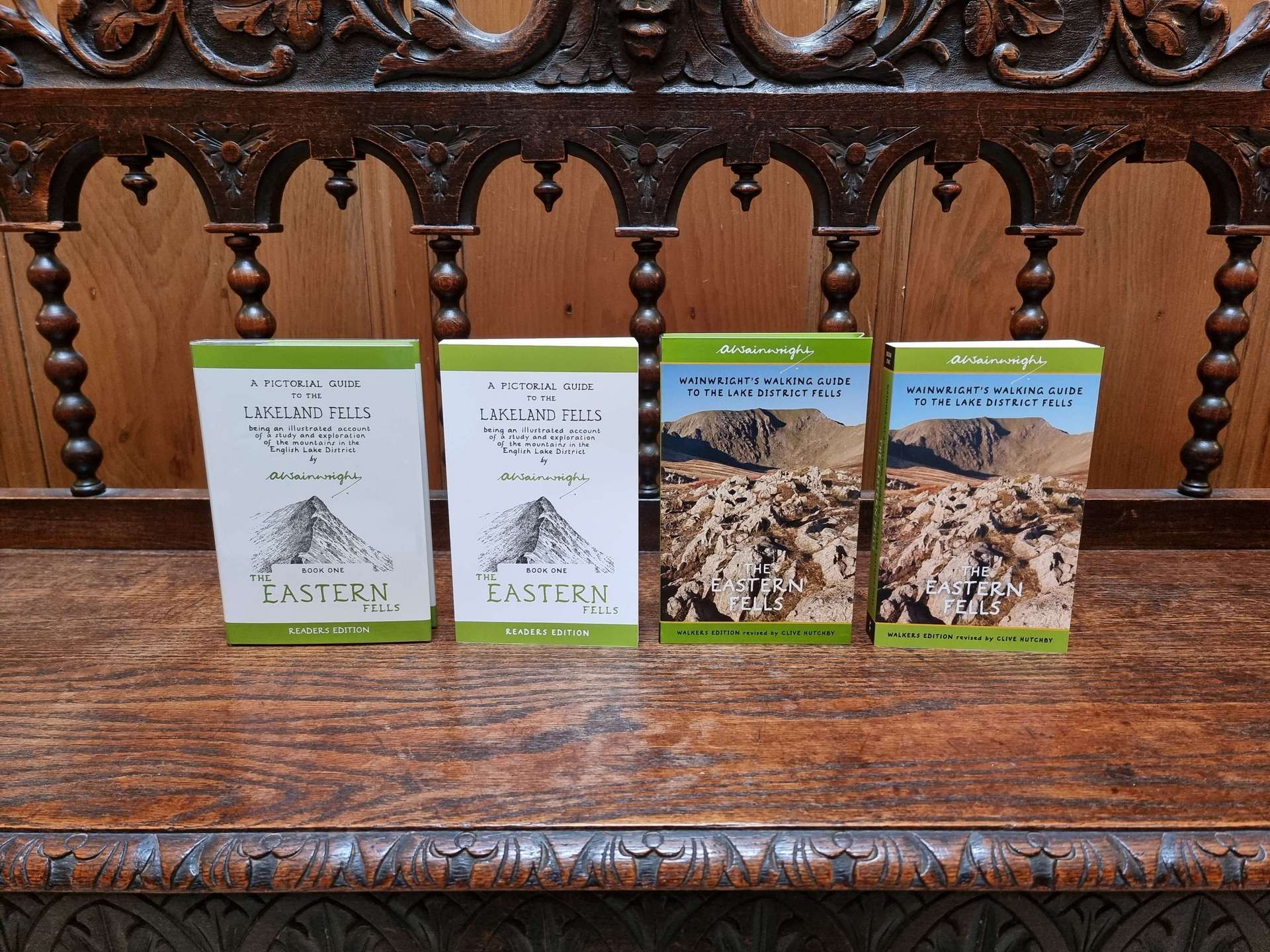
From left to right:
The Eastern Fells (RE) hardback, F. Lincoln 2017
The Eastern Fells (RE) paperback, F. Lincoln 2022
The Eastern Fells (WE) flexibound, F. Lincoln 2015
The Eastern Fells (WE) paperback, F. Lincoln 2020



